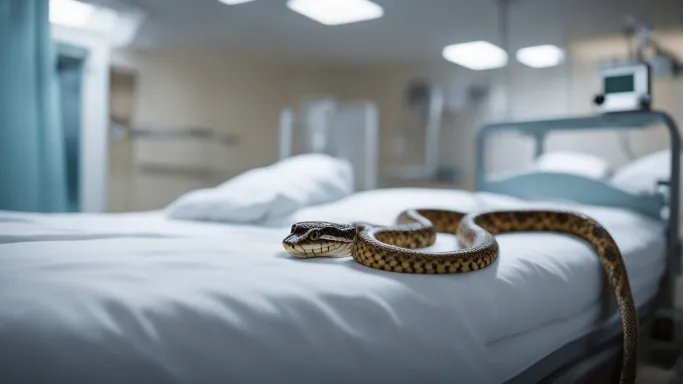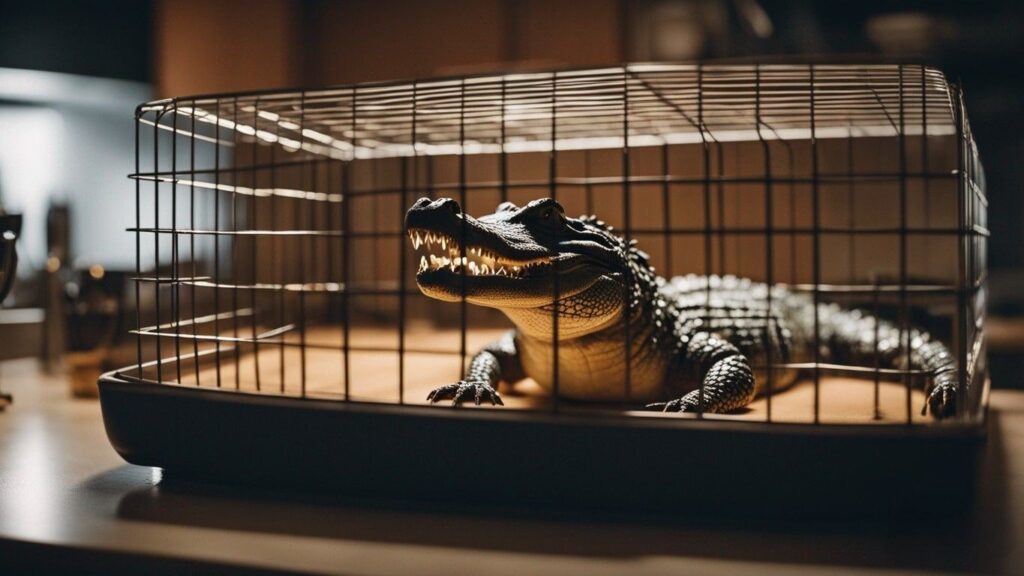So you’re considering getting a pet lizard, but you have concerns about the health risks? You may have heard rumors about reptiles carrying diseases, but is there any truth to this?
In this article, we will explore the common question, “Do pet lizards carry diseases?” We’ll examine the potential risks and precautions you can take to ensure the health and safety of both you and your scaly companion.
Whether you’re a seasoned reptile owner or simply curious, this article will provide you with the facts you need to make an informed decision about welcoming a pet lizard into your home.

Common diseases in pet lizards
Respiratory infections
Respiratory infections can occur in pet lizards, just like in any other animal. These infections often result from a weakened immune system or poor living conditions. Common signs of respiratory infections in lizards include wheezing, coughing, nasal discharge, labored breathing, and open-mouth breathing. It is essential to seek veterinary care promptly if you suspect your lizard has a respiratory infection because if left untreated, it can lead to severe complications or even death.
Gastrointestinal infections
Gastrointestinal infections affect the digestive system of pet lizards and are usually caused by bacteria or parasites. Symptoms of gastrointestinal infections can vary, but they often include diarrhea, bloating, loss of appetite, and weight loss. These infections can be quite serious and may require veterinary intervention to diagnose and treat effectively. It is crucial to maintain proper hygiene and provide a clean and suitable environment to prevent the occurrence of gastrointestinal infections in pet lizards.
Fungal infections
Fungal infections are relatively common in pet lizards and can affect various parts of their bodies, including the skin, mouth, and respiratory system. Fungi thrive in warm and moist environments, making reptiles more susceptible to these infections. Symptoms of fungal infections may include skin lesions, discoloration, swelling, respiratory problems, and a decrease in appetite. Treating fungal infections in lizards often requires antifungal medications prescribed by a veterinarian.
Parasitic infections
Parasitic infections are another common health issue in pet lizards. Parasites such as mites, ticks, and worms can infest their skin, gastrointestinal tract, or respiratory system. These infections can cause significant discomfort and health problems for lizards if left untreated. Symptoms of parasitic infections include itching, skin irritation, anemia, weight loss, and a decline in overall health. Regular veterinary check-ups and proper hygiene practices can help prevent and manage parasitic infections in pet lizards.
Metabolic bone disease
Metabolic bone disease is a condition that affects the skeletal system of lizards, primarily due to calcium and vitamin D deficiencies. This disease is most commonly seen in lizards kept in captivity, as they may not receive adequate exposure to sunlight or proper nutrition. Signs of metabolic bone disease in lizards include soft or brittle bones, difficulty in movement, tremors, deformities, and fractures. It is crucial to provide lizards with a well-balanced diet and the necessary UVB lighting to prevent metabolic bone disease.
Transmission of diseases
Direct contact
Direct contact with infected lizards or their bodily fluids is one of the primary modes of disease transmission. Diseases such as respiratory infections and fungal infections can spread through direct contact with an infected lizard. It is important to practice proper hygiene and avoid handling sick lizards without taking necessary precautions.
Contaminated substrates and food
Contaminated substrates and food can introduce pathogens and parasites into a lizard’s living environment. Bacterial and parasitic infections may be transmitted through contaminated substrates and food items. To minimize the risk of disease transmission, it is crucial to provide clean and hygienic living conditions for pet lizards and ensure that their food is fresh and free from contamination.
Vectors
Vectors, such as mites and ticks, can transmit various diseases to pet lizards. These external parasites can carry pathogens and spread them from one lizard to another. Regular inspection and prevention measures can help reduce the risk of vector-borne diseases in pet lizards.
From other pets or wildlife
Pet lizards can contract diseases from other pets or wildlife they come into contact with. If a lizard interacts with other animals, such as dogs, cats, or wild reptiles, there is a potential risk of disease transmission. Keeping lizards in separate enclosures and minimizing exposure to other animals can help prevent the spread of diseases between different species.
From humans
Some diseases can be transmitted from humans to pet lizards. For example, certain zoonotic diseases, like salmonellosis, can be transmitted through close contact with an infected person. It is crucial to practice proper hand hygiene and avoid exposing lizards to potentially harmful pathogens.
Impact on human health
Zoonotic diseases
Zoonotic diseases are those that can be transmitted between animals and humans. While the risk is relatively low, pet lizards can potentially transmit certain diseases to their owners. It is important to be aware of zoonotic diseases and take necessary precautions to minimize the risk of transmission.
Salmonellosis
One of the most well-known zoonotic diseases associated with reptiles, including pet lizards, is salmonellosis. Salmonella bacteria naturally reside in the digestive tracts of many reptiles, and they can be shed through their feces. If proper hygiene practices are not followed, the bacteria can transfer to humans, causing illness. Symptoms of salmonellosis in humans include diarrhea, fever, abdominal cramps, and vomiting.
Campylobacteriosis
Campylobacteriosis is another zoonotic disease that can be transmitted from pet lizards to humans. This bacterial infection can cause gastrointestinal symptoms in humans, including diarrhea, abdominal pain, and fever. It is important to handle pet lizards properly and practice good hand hygiene to minimize the risk of transmission.
Cryptosporidiosis
Cryptosporidiosis is caused by a microscopic parasite called Cryptosporidium. While it is more commonly associated with contaminated water sources, pet lizards can also carry and transmit this parasite. In humans, cryptosporidiosis primarily affects the digestive system and can cause severe diarrhea, stomach cramps, and dehydration.
Leptospirosis
Leptospirosis is a bacterial infection that can be transmitted to humans from infected animals, including lizards. This disease is primarily spread through contact with contaminated urine or water. While it is relatively rare in pet lizards, it is essential to take precautions and seek medical attention if you suspect you may have been exposed to leptospirosis.
Preventive measures
Proper hygiene practices
Maintaining good hygiene practices is crucial in preventing the spread of diseases between pet lizards, other animals, and humans. This includes washing hands thoroughly after handling lizards or cleaning their enclosures, using proper cleaning agents for disinfection, and avoiding contact with an infected lizard or its waste.
Regular veterinary check-ups
Regular veterinary check-ups are essential to ensure the overall health of pet lizards. A veterinarian can examine the lizard, identify any potential health issues, and provide appropriate treatment or preventive measures.
Quarantine and screening
Quarantining new lizards before introducing them to an existing reptile collection can help prevent the spread of diseases. It is important to keep new lizards separate for a certain period and monitor their health status before introducing them to other lizards.
Careful handling and interaction
Proper handling and interaction with pet lizards can minimize the risk of injury and potential disease transmission. Avoid rough handling, and always wash hands before and after handling lizards.
Safe cleaning and disposal of waste
Proper cleaning and disposal of waste materials are essential to maintain a healthy environment for pet lizards. Regularly clean and sanitize their enclosures, dispose of waste properly, and avoid cross-contamination.
Risks for immunocompromised individuals
Increased susceptibility to infections
Immunocompromised individuals, such as those with weakened immune systems, are at a higher risk of contracting infections from pet lizards. Their immune systems may not be able to effectively fight off pathogens, making them more susceptible to diseases carried by lizards.
Specific precautions to take
Immunocompromised individuals should take extra precautions when handling pet lizards. This includes avoiding direct contact with lizard waste, practicing thorough hand hygiene, and potentially limiting their exposure to reptiles altogether. Consultation with a healthcare professional is recommended for specific guidance on managing the risks associated with pet lizards.
Recognizing signs of illness
Behavioral changes
Behavioral changes in pet lizards can indicate underlying health issues. These changes may include lethargy, decreased activity levels, changes in appetite, aggression, hiding, or abnormal behavior. Monitoring your lizard’s behavior and seeking veterinary care if you notice significant changes is important.
Respiratory symptoms
Respiratory symptoms, such as wheezing, coughing, open-mouth breathing, or difficulty breathing, can be signs of respiratory infections in pet lizards. Prompt veterinary attention is crucial to diagnose and treat respiratory infections effectively.
Digestive problems
Digestive problems can manifest as diarrhea, bloating, constipation, loss of appetite, or unusual fecal consistency. If you notice any significant changes in your lizard’s digestive system, it is recommended to seek veterinary care.
Skin issues
Skin issues, such as lesions, discoloration, swelling, or abnormal shedding, can be signs of fungal or bacterial infections in pet lizards. Regularly inspecting your lizard’s skin and seeking veterinary care if you notice any abnormalities is important to maintain their health.
Lethargy and loss of appetite
Lethargy and loss of appetite can be indicators of various underlying health problems in pet lizards. If your lizard appears unenergetic or shows a lack of interest in food for an extended period, it is advisable to consult a veterinarian.
When to seek veterinary care
Persistent symptoms
If your pet lizard exhibits persistent symptoms of illness, such as respiratory distress, digestive issues, or behavioral changes, it is essential to seek veterinary care. Long-lasting or recurring symptoms may indicate underlying health problems that require professional attention.
Visible physical changes
Visible physical changes, such as wounds, lesions, swelling, or deformities, should not be ignored. These changes may indicate an underlying infection or injury that warrants veterinary evaluation.
Abnormal behaviors
An abrupt change in behavior, such as aggression, excessive hiding, or disorientation, can be a cause for concern. If your lizard’s behavior significantly deviates from its usual patterns, it is advisable to consult a veterinarian to rule out any health issues.
Concerns about potential diseases
If you have concerns about the potential transmission of diseases from your pet lizard to yourself or others, it is important to seek professional advice. A veterinarian or healthcare provider can provide guidance on preventive measures and address any specific concerns.
Treatment options
Antibiotics, antifungals, and antiparasitics
Depending on the specific disease or infection, treatment options for pet lizards may include medications such as antibiotics, antifungals, or antiparasitics. These medications can help combat bacterial, fungal, or parasitic infections and promote healing.
Supportive care
Supportive care measures, such as maintaining proper hydration, providing a balanced diet, and creating a comfortable environment, are essential components of treating sick pet lizards. These measures can help support their immune system and aid in recovery.
Medical procedures
In some cases, medical procedures may be necessary to treat certain conditions or address complications. These procedures may include surgeries, wound dressings, or diagnostic tests to identify the root cause of the illness.
Rehabilitation and environmental management
In cases of metabolic bone disease or other conditions that require long-term management, rehabilitation and environmental adjustments may be necessary. This may involve providing special lighting, adjusting temperature and humidity levels, and offering specific dietary supplements.
Proper care and husbandry
Optimal living conditions
Providing optimal living conditions is crucial for maintaining the overall health and well-being of pet lizards. This includes maintaining appropriate temperature and humidity levels, offering a suitable enclosure size, and providing hiding spots and climbing areas.
Appropriate diet and nutrition
A well-balanced diet is essential for the health of pet lizards. The diet should consist of species-specific food items and be supplemented with appropriate nutrients, such as calcium and vitamin D. Consultation with a veterinarian or reptile nutrition expert can help ensure proper nutrition for your lizard.
Temperature and humidity control
Lizards have specific temperature and humidity requirements based on their species. It is important to provide the appropriate temperature gradients and humidity levels within their enclosures to mimic their natural habitat and promote their well-being.
Regular cleaning and maintenance
Regular cleaning and maintenance of the lizard’s enclosure are necessary to prevent the buildup of waste, bacteria, and parasites. Regularly remove feces, shed skin, and uneaten food, and clean the enclosure with appropriate disinfectants to maintain a hygienic environment.
Reducing stress factors
Stress can weaken a lizard’s immune system and make them more susceptible to diseases. Minimize stress factors by providing a calm and secure environment, avoiding sudden changes, and practicing gentle handling techniques.
Educating pet owners
Knowledge about potential risks
Educating pet owners about the potential risks associated with pet lizards is crucial for responsible ownership. Owners should be aware of zoonotic diseases, proper hygiene practices, and potential health concerns specific to their lizard’s species.
Responsible pet ownership
Responsible pet ownership includes providing proper care, nutrition, and hygiene for pet lizards. It involves regular veterinary check-ups, maintaining suitable living conditions, and being informed about potential health risks and preventive measures.
Proper handling and hand hygiene
Educating pet owners about proper handling techniques and hand hygiene is essential to minimize the risk of disease transmission. Owners should be aware of the potential pathogens carried by lizards and take appropriate precautions when handling or interacting with their pets.
Awareness of zoonotic diseases
Raising awareness about zoonotic diseases, such as salmonellosis, among pet owners is crucial to prevent the spread of these infections. Knowing the signs and symptoms of these diseases and practicing preventive measures can help protect both humans and their pet lizards.
Sharing information with health professionals
Pet owners should share relevant information about their pet lizards with healthcare professionals, especially if they have a compromised immune system. This information can help healthcare providers assess potential risks and provide appropriate recommendations for handling pet lizards safely.
Final Thoughts
Having a pet lizard can be a fulfilling experience, but potential health risks for both the owner and the pet are worth considering.
While lizards can carry various diseases, including respiratory and gastrointestinal infections, proper care, hygiene, and regular veterinary visits can mitigate most risks.
Owners should be mindful of zoonotic diseases like salmonellosis and maintain a clean environment to prevent the spread of infections.
Moreover, it is essential to provide optimal living conditions and a balanced diet to safeguard the lizard’s health.
Additionally, education about responsible pet ownership and potential health risks is crucial in promoting safe and enjoyable pet-human relationships.
If well managed, owning a pet lizard can be a healthy and rewarding experience.



